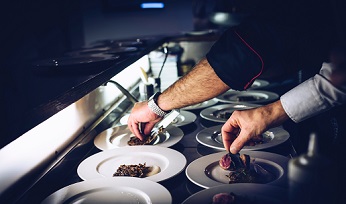 The restaurant business is a unique field. Almost every job that is done there is something we all do at home on a daily basis. For that reason, many people in the food service industry—even managers—mistakenly assume that there is no need for in-depth training for their personnel.
The restaurant business is a unique field. Almost every job that is done there is something we all do at home on a daily basis. For that reason, many people in the food service industry—even managers—mistakenly assume that there is no need for in-depth training for their personnel.
Of course, nothing could be further from the truth. To begin with, there are regulatory reasons for getting personnel trained. One misstep in an area such as alcohol service could lead to massive fines and potentially the loss of the license to sell liquor. Given the profitability and drawing power of serving alcohol, the end of the license could be the end of the business.
Servers aren’t the only ones with legal responsibilities, and they extend far beyond alcohol. This highlights many of the ways that home food preparation is far different from what’s done in the restaurant industry, and why it’s essential for all restaurant staff to have a California Food Handlers Card or the appropriate equivalent for their state.
The Importance of Due Date Monitoring
Consider food storage. In our home refrigerators, we know that we opened that package of lunchmeat on Sunday, so we know it needs to be eaten this week. But in a restaurant with shelves full of product in a massive walk-in cooler, those facts must be documented to ensure that nothing is kept past its date. That’s true even in a small restaurant where the chef is as intimately familiar with what’s in the cooler as anyone is with their home refrigerator.
Food preparation is another aspect. Ensuring that equipment is operating at the correct temperature is just the first of many steps in verifying that all food is properly stored and handled. Personnel need to verify that they are qualified to calibrate gauges or that they know procedures for cross-checking across multiple thermometers to verify that readings are accurate.
An added upside to temperature regulation is energy savings. When equipment is definitely operating at the right temperature—and when the staff is confident that it is—there is no temptation for them to overestimate or underestimate and to alter operating temperatures accordingly. In other words, if the staff knows the cooler is at the right temperature, they won’t be tempted to turn the thermostat even lower “just to be sure”.
So when qualified people use well-maintained equipment in the correct way, the functionality of the restaurant improves—and the carbon footprint is made smaller at the same time. The trend toward improved operations and appliances in restaurants is helping the entire industry get a greener image.
Educate About Cross-Contamination
There are areas far beyond temperatures that personnel need to understand. They should know about things that can cause foodborne illness. Common culprits like cross-contamination must be avoided, and the only way to verify that personnel have been properly trained on how to do that is for them to complete an accredited program and to attain and keep the relevant credentials.
Kitchen safety for employees is essential as well. Every restaurant has hot equipment and sharp utensils, and most have heavy machinery that can cause disfiguring, debilitating injuries. The only way to reduce the risk of potentially life-changing injuries from those hazards is through training and certification.
As customers, we feel like a meal in a restaurant is very little different from a meal at home—just a lot less work for us. But for those who are doing the work for us, it’s a complicated and dangerous business that calls for capable people who have been verified competent by an outside firm with established standards. Only then can the food service be truly safe.





